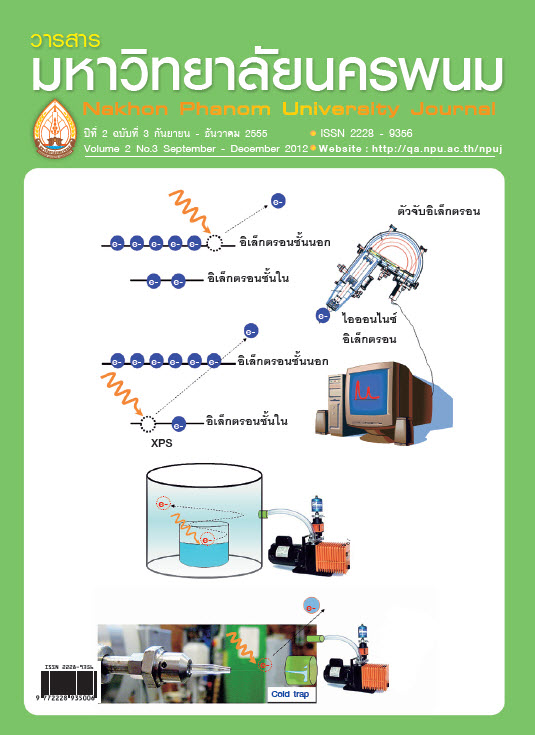การเปรียบเทียบผลสัมฤทธิ์ทางการเรียนวิชาวิทยาศาสตร์ และความสามารถด้านการคิดวิเคราะห์ ชั้นมัธยมศึกษาปีที่ 1 เรื่อง สารและสมบัติของสาร ระหว่างการจัดการเรียนรู้โดยใช้แผนผังความคิดกับแบบสืบเสาะหาความรู้ 7 ขั้น
Main Article Content
Abstract
การวิจัยครั้งนี้มีวัตถุประสงค์เพื่อหาประสิทธิภาพและดัชนีประสิทธิผลของแผนการจัดการเรียนรู้วิทยาศาสตร์ ชั้นมัธยมศึกษาปีที่ 1 เรื่อง สารและสมบัติของสาร ด้วยการจัดการเรียนรู้โดยใช้แผนผังความคิดกับการจัดการเรียนรู้แบบสืบเสาะ หาความรู้ 7 ขั้น และเปรียบเทียบผลสัมฤทธิ์ทางการเรียน และความสามารถด้านการคิดวิเคราะห์ ของนักเรียนชั้นมัธยมศึกษาปีที่ 1 ที่ได้รับการจัดการเรียนรู้โดยใช้แผนผังความคิดกับแบบสืบเสาะหาความรู้ 7 ขั้น ประชากรได้แก่ นักเรียนชั้นมัธยมศึกษาปีที่ 1 โรงเรียน สหราษฎร์รังสฤษดิ์ อำเภอศรีสงคราม จังหวัดนครพนม สำนักงานเขตพื้นที่มัธยมศึกษานครพนม ภาคเรียนที่ 1 ปีการศึกษา 2554 จำนวน 7 ห้อง รวมทั้งสิ้น 292 คน กลุ่มตัวอย่างที่ใช้ในการวิจัย ได้แก่ นักเรียนชั้นมัธยมศึกษาปีที่ 1 จำนวน 60 คน จาก 2 ห้อง ซึ่งได้ มาโดยการสุ่มแบบเป็นกลุ่ม ได้ห้อง 1/6 จำนวน 30 คน จัดการเรียนรู้โดยใช้แผนผังความคิด และได้ห้อง 1/7 จำนวน 30 คน จัดการ เรียนรู้แบบสืบเสาะหาความรู้ 7 ขั้น เครื่องมือที่ใช้ในการวิจัย คือ แผนการจัดการเรียนรู้โดยใช้แผนผังความคิดและแผนการจัดการเรียนรู้ แบบสืบเสาะหาความรู้ 7 ขั้น วิธีละ 6 แผน แบบทดสอบผลสัมฤทธิ์ทางการเรียน ชนิดเลือกตอบ 4 ตัวเลือก จำนวน 30 ข้อ มีค่าอำนาจจำแนกรายข้อ ตั้งแต่ 0.44 ถึง 0.95 และค่าความเชื่อมั่นเท่ากับ 0.92 แบบวัดความสามารถด้านการคิดวิเคราะห์ ชนิดเลือกตอบ 4 ตัว เลือก จำนวน 20 ข้อ มีค่าอำนาจจำแนกตั้งแต่ 0.24 ถึง 0.91 มีค่าความยากตั้งแต่ 0.23 ถึง 0.72 และค่าความเชื่อมั่นทั้ง 0.77 สถิติที่ใช้ได้แก่ ร้อยละ ค่าเฉลี่ย ส่วนเบี่ยงเบนมาตรฐาน และทดสอบสมมติฐานด้วย t-test (Independent Samples) ผลการวิจัย พบว่า 1) แผนการจัดการเรียนรู้วิชาวิทยาศาสตร์ ที่จัดการเรียนรู้โดยใช้แผนผังความคิดมีประสิทธิภาพ เท่ากับ 83.56/82.56 และแผนการ จัดการเรียนรู้แบบสืบเสาะหาความรู้ 7 ขั้น มีประสิทธิภาพ เท่ากับ 80.10/78.00 ซึ่งสูงกว่าเกณฑ์ที่กำหนด 2) ดัชนีประสิทธิผลของ แผนการจัดการเรียนรู้โดยใช้แผนผังความคิดกับแผนการจัดการเรียนรู้แบบสืบเสาะหาความรู้ 7 ขั้น มีค่าเท่ากับ 0.7374 และ 66.21ตามลำดับ แสดงว่านักเรียนมีคะแนนหลังเรียนสูงกว่าก่อนเรียนคิดเป็นร้อยละ 73.74 และ 66.21 ตามลำดับ 3) นักเรียนที่เรียนรู้โดยใช้ แผนผังความคิดมีผลสัมฤทธิ์ทางการเรียนและความสามารถด้านการคิดวิเคราะห์ สูงกว่านักเรียนที่เรียนแบบสืบเสาะหาความรู้ 7 ขั้น อย่างมีนัยสำคัญทางสถิติที่ระดับ .01
The purposes of this study were to investigate efficiency of the lesson plans and effectiveness indices of the lesson plans on the learning activity entitled ‘Substances and their Chemistry’ between using Mind Mapping and 7 E Inquiry Learning approaches based on Mind Mapping and 7E Inquiry Learning for Mattayomsuksa 1 students, and to compare learning achievement and analytical thinking ability of Mattayomsuksa 1 students between using Mind Mapping and 7 E Inquiry Learning approaches. The population of this research were 292 Matthayomsuksa 1 students attending Saharajrangsarid School in Sri Songkhram District in Nakhon Phanom province, under the Office of Nakhon Phanom Secondary Educational Service Area. They were studying in the first semester in an academic year 2011. The samples were 60 Mattayomsuksa 1 students selected by means of cluster random sampling. They were divided into two groups: 30 students learning mind mapping approach and 30 students learning 7E inquiry learning approach. The instruments used in this study were: 6 Lesson plans of each based mind mapping and 7E inquiry learning approaches, 30-iterm achievement test with the discrimination value between .44-.95 and the reliability of .92, 20-item analytical thinking ability test with the discrimination between .24 - .91, the difficulty between .23 - .72, and the reliability of .77. The statistics employed in data analysis were percentage, mean, standard deviation and t-test (Independent Samples). The results of this study were as follows: 1) The efficiency of the lesson plans on the learning activity entitled ‘Substances and their Chemistry’ using Mind Mapping was at 83.56/82.56 and the efficiency of the lesson plans based on 7E Inquiry Learning approaches was at 80.10/78.00 which were higher than the determined criterion, 2) The effectiveness indices of both of using mind mapping and 7 E inquiry learning approaches were 0.7374 and 0.6621 respectively; showing that the students had learning progress at 73.74 percent and 66.21 percent respectively, and 3) Thestudents who learned through mind mapping approach showed higher learning achievement and analytical thinking ability than those who learned 7E inquiry learning approach at the significant level of .01.


